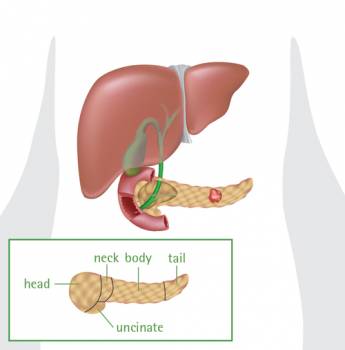Pancreatic Cancer
 The pancreas is an organ in the abdomen that lies horizontally behind the lower part of the stomach. Within the pancreas, exocrine pancreas cells produce digestive juices, while endocrine pancreas cells produce the hormones insulin and glucagon, which regulate blood sugar levels in the body.
The pancreas is an organ in the abdomen that lies horizontally behind the lower part of the stomach. Within the pancreas, exocrine pancreas cells produce digestive juices, while endocrine pancreas cells produce the hormones insulin and glucagon, which regulate blood sugar levels in the body.
Pancreatic cancer is a disease in which malignant (cancerous) cells form in the tissues of the pancreas. The majority of pancreatic cancer cases start in the exocrine cells.
In the United States, it is the fourth most common cause of cancer deaths, with actor Patrick Swayze and more recently, Apple’s Steve Jobs, both losing their battles with pancreatic cancer in recent years.
In Singapore, the incidence of pancreatic cancer has increased over the past 40 years, with approximately 1000 cases diagnosed between 2003 and 2007. Although pancreatic cancer did not feature among the ten most common cancers in Singapore, it represented the sixth and seventh most common cause of cancer death in Singaporean males and females, respectively.
What Causes Pancreatic Cancer?
The cause of pancreatic cancer remains unclear. However, people with certain risk factors may be more likely than others to develop pancreatic cancer.
 Such risk factors include:
Such risk factors include:
• Smoking: Smoking tobacco is the most important risk factor for pancreatic cancer. Heavy smokers are at greatest risk.
• Diabetes: People with diabetes are more likely than others to develop pancreatic cancer.
• Family history: Having a mother, father, sister, or brother with pancreatic cancer increases the risk of developing the disease.
• Pancreatitis (inflammation of the pancreas): Having pancreatitis for a long time may increase the risk of pancreatic cancer.
• Obesity: People who are overweight or obese are slightly more likely than others to develop pancreatic cancer.
Signs and Symptoms
As symptoms are vague and the pancreas lies behind other organs, pancreatic cancer is often diagnosed at an advanced stage. Weight loss is one of the earlier symptoms and middle or upper abdominal pain is common late in the disease.
Other possible symptoms include indigestion, bloating and oily bowel movements if the cancerous growth blocks the pancreatic duct and digestive enzymes are not released into the intestinal tract.
Jaundice – yellowing of the skin or the white of the eyes – may also be a warning sign caused by a tumour blocking the bile duct.
Diagnosis & Assessment
 If pancreatic cancer is suspected, a computed tomography (CT) scan of the abdomen may be done. Magnetic resonance imaging (MRI) scans may also be carried out to help doctors “visualise” the pancreas, thus aiding treatment.
If pancreatic cancer is suspected, a computed tomography (CT) scan of the abdomen may be done. Magnetic resonance imaging (MRI) scans may also be carried out to help doctors “visualise” the pancreas, thus aiding treatment.
An endoscopic retrograde cholangio-pancreatography (ERCP) is usually done once pancreatic cancer is a likely diagnosis. This uses a fibreoptic scope to look into the stomach and small intestine where the ducts of the pancreas drain into. X-ray dye is injected into the ducts of the pancreas and images taken of the organ, allowing irregularities of the pancreatic ducts to be identified. During the ERCP procedure, tissues may also be removed for a biopsy.
Another method known as endoscopic ultrasound (EUS) uses an ultrasound device to take images of the pancreas from inside the abdomen. The ultrasound device is passed through a fibreoptic scope down the oesophagus and into the stomach in order to obtain the images. It is also possible to remove a sample of cells for a biopsy during EUS.
Treatment & Care
How is Pancreatic Cancer Treated?
Pancreatic cancer can be treated with several methods. Early stage pancreatic cancer can often be treated and possibly cured with surgery. After surgery, further treatment, known as adjuvant therapy, is often recommended. This may involve chemotherapy or radiotherapy.
However, many patients are diagnosed with advanced pancreatic cancer where surgery is often not possible. If surgery is not possible, treatment with radiotherapy, chemotherapy, or both are often used to shrink the cancer, reduce symptoms, and prolong life.
What kind of support is available?

CanHOPE, is a non-profit cancer counselling & support service initiated by Parkway Cancer Centre.
As part of the holistic approach towards cancer treatment, CanHOPE works closely with the medical & allied health professionals, offering a wide range of resources & information about cancer in helping patients & their caregivers to make effective, informed decisions in their treatment journey.
Join us in our support programmes that are available on a monthly basis.
CALL our CanHOPE counsellors: +65 67389333 or e-mail: This email address is being protected from spambots. You need JavaScript enabled to view it.
What Is Pancreatic Cancer? originally appeared on Parkway Cancer Centre and has been republished with permission
Further Reading
The article above is meant to provide general information and does not replace a doctor's consultation.
Please see your doctor for professional advice.
